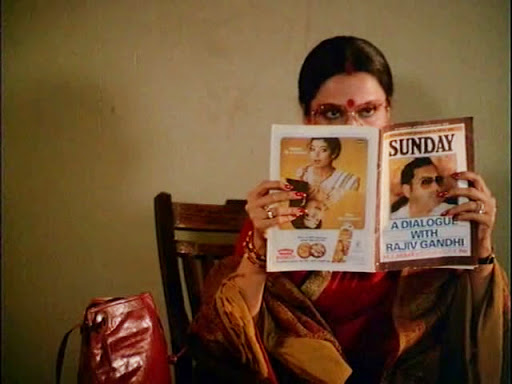Aesthetic dialogues and melty songs break the molds

March 4, 2020
One of my favorite films is an 80’s Hindi film, Ijazaat, which means “Permission.”
If you can find it with subtitles, I 10/10 recommend this piece! Not only are the songs just eternal bops of sadness, but the premise was so new for the time and so refreshing. I’d first watched it with my dad when I was like eleven, and I didn’t really care for it, nor could I get why my dad liked it so much. It just seemed so mopey. Like god, pick a girl!
Now, though, it reminds me of an art film, where the concept is a bit too new for the masses—not anymore, however, but the 80’s? Yes. The director, Gulzar, has always delivered amazing performances with stories that come out to tease you just a bit. This could have been a straight-cut full-on spicy husband-wife-mistress drama (I deserve an award for that disgusting sentence). But it isn’t. It’s sensitive. It’s new. Neither one of the women is seen as sleazy or loose, but both are respectable and intelligent. Suddenly it’s based around what the women lose and gain. Suddenly the man doesn’t get away with things. Orthodox views have to change, and you sympathize with all of them.
The camera work, subtly in acting, the work in silence, the artsy dialogues (No, I’m serious; “It was autumn then, wasn’t it? Once, I took the whispering sound of falling leaves and wore them as my earrings,” or “My breaths are too short, like hurried gasps, give me just one long breath on a loan”), songs formed like poems and the way the songs are sewn into the plot, the flaws and duality in each person, the sympathy you feel for each, and the that end leaves you slightly surprised at the choices each took.
Even at the beginning of the film, you’re welcomed into a the film following a man into a rainy night at a train station waiting room, riddled with characters and alternate stories of their own. A couple feeding their child biscuits, an old man guarding his bag viciously, an overly friendly ticket collector, a woman peeking over a magazine. You know absolutely nothing about them, but the looks they share, and the feeling of intimacy lets you in on what words could never.
It runs in a flashback, 5 years before and centers around three people: Maya, Sudha, and Mahender.
Maya is a free loving, impetuous woman, with detached ideology, loving in the moment and then leaving the next. Having an intimate relationship with a man and then not. Nothing about her is secure or guaranteed. She has tendencies to up and leave for days at a time, but always returns to him, saying her love wins her over.
 What’s new here is that, typically, free women like her are either villains or “tamed” in films back then. Changed to become that picture of purity society asks for, or just vanquished as the villain trying to defeat the main female protagonist. But Maya, she remains untouched, unsoiled. She is, and she will be. This encouraged women to be that way—free, independent and to conduct themselves the way they want. She had a personality, and it wasn’t negative, just different. The model “Indian Woman” is taken to be as pure as our goddesses (for those who are Hindu), and in some way, we had started to take them as demure and pure, rather than the multiple facets each had, being strong, crafty and even murderous.
What’s new here is that, typically, free women like her are either villains or “tamed” in films back then. Changed to become that picture of purity society asks for, or just vanquished as the villain trying to defeat the main female protagonist. But Maya, she remains untouched, unsoiled. She is, and she will be. This encouraged women to be that way—free, independent and to conduct themselves the way they want. She had a personality, and it wasn’t negative, just different. The model “Indian Woman” is taken to be as pure as our goddesses (for those who are Hindu), and in some way, we had started to take them as demure and pure, rather than the multiple facets each had, being strong, crafty and even murderous.
Here, Maya was still the revered “Indian Woman”, the one modeled after our goddesses, but just a different form than prim and proper, which is what each woman has in her.
Mahender, a professional photographer, is in love with her and knows that the wind in her sails will never slow her down. So he takes the time he has with her, knowing her absence is inevitable. At the same time, he’s engaged by his uncle to a young elementary school teacher, Sudha. When he met her, he’s honest with her about his current relationship with Maya. The character is mature, honest and sensitive, aware that he’s unwittingly playing with two people’s feelings. Mahender is not wrong in either, just stuck between duty and desire, and eventually one has to win, and someone is hurt.
Sudha is the very opposite of Maya. Though a strong independent woman, she values family values and monogamy. The perfect woman, essentially. She wears traditional clothing, a red bindi and longs for a regular married life with him, despite his relationship. As they are married, Maya leaves again, and they’re happy with their life. The next time she returns however, Mahender builds a new friendship with her, and Sudha met with the inability to share him even a bit. Eventually, the jealousy between the two women doesn’t cause hate, but shame in themselves for interfering. Sudha’s vulnerability and pain match Maya’s anger and guilt. Finally, both women leave Mehender, Sudha for believing the marriage never had love and Maya for believing she’d never get the same title as his wife. It gave both the choice to leave when they saw that they were not wanted nor respected, making them seperate entities rather than a shadow of the man they love.
The music is especially haunting, one song encompassing Maya’s grief through a poem she sent the couple after Sudha sent Maya a box of things she left in their house from her time with Mahender.
With these few translated lines, I’m going to close since this is getting long, and you are most likely getting bored. I strongly encourage you to watch this film or at least appreciate the utter artsy-ness.
“Some of my things are with you.
A few rainy days,
and a night folded into one of my letters.
Extinguish that night, and return my things.
One hundred and sixteen moonlit nights, and that single mole on your shoulder.
Shall I remind you of all the false promises too?
Send all of them back, and return my things.
And when I bury these things, just grant me the permission
To lay myself to sleep with them.”





